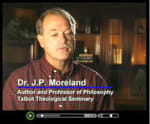Secular Philosophy
Secular Philosophy – Naturalism
Secular Philosophy is grounded in Naturalism (or Materialism). Naturalism is the philosophical belief that reality is composed solely of matter and that all phenomena can be explained in terms of natural causes (e.g., law of gravity). Roy Wood Sellars tells us, “Humanism is naturalistic and rejects the supernaturalistic stance with its postulated Creator-God and cosmic Ruler.”1
Secular Humanists list a variety of philosophical positions that fit their worldview: naturalism, physicalism, materialism, organicism, or other theories “based upon science.” But this choice is not as broad as it sounds—each doctrine listed holds to the same core tenet: the material world is all that exists. In fact, each option presented is really little more than a synonym for naturalism, the philosophical view of Secular Humanism.
This dogmatic position is summarized in Humanist Manifesto II: “Nature may indeed be broader and deeper than we now know; any new discoveries, however, will but enlarge our knowledge of the natural.”2 The essence of naturalism, then, is this—whatever exists can be explained by natural causes. Thus, in a Humanist’s mind, the supernatural cannot exist. While some Humanists prefer to call themselves organicists or materialists (or “scientific” materialists), the name makes little difference. As Corliss Lamont notes, “Materialism denotes the same general attitude toward the universe as Naturalism.”3
Secular Philosophy – Denial of the Supernatural
The key tenet of Secular Philosophy (Naturalism) is its denial of the supernatural. People either believe that only the supernatural exists, or that some supernatural things and some natural things exist, or that only natural things exist. By “supernatural,” philosophers generally mean things that are not material, such as the soul, personality, or God. Naturalists deny everything that is not made up of matter or that does not exist in nature.
This current of thought runs throughout Humanist beliefs. Sellars writes, “Christianity, for example, had a supernaturalistic framework in a three-tier universe of heaven, earth and hell...The Humanist argues that the traditional Christian outlook has been undercut and rendered obsolete by the growth of knowledge about man and his world.”4 Humanists rely on this “growth of knowledge” to provide a more accurate worldview. Naturalism insists that an object be observable and measurable to be believable.
Naturalists are especially unwilling to believe in a universe that exudes too much design, because this design could be construed as evidence for a Designer.5 The naturalist cannot accept a Designer or a personal First Cause. Henry Miller plainly states, “To imagine that we are going to be saved by outside intervention, whether in the shape of an analyst, a dictator, a savior, or even God, is sheer folly.”6
Naturalistic Humanism, then, is a complete philosophy. Corliss Lamont puts it this way: “To define naturalistic Humanism in a nutshell: it rejects all forms of supernaturalism, pantheism, and metaphysical idealism, and considers man’s supreme aim as working for the welfare and progress of all humanity in this one and only life, according to the methods of reason, science and democracy.”7 This definition is important from a philosophical perspective because it outlines both the metaphysics and epistemology of naturalism. This chapter will focus on the metaphysics (specifically the cosmology) of naturalism first, and then explore its epistemology.
Secular Philosophy – Science as the Source of Knowledge
Secular Philosophy’s denial of the supernatural and reliance on science as its source of knowledge necessitates specific conclusions about our mortality, our mind, and the very nature of our humanity. The resulting worldview may seem to elevate our importance in terms of our ability to control our fate. However, this responsibility becomes a burden resulting in a pessimistic view, for without God or an eternal soul, we are left without hope or purpose in life. E.A. Burtt believes “the ultimate accommodation necessary in a wise plan of life is acceptance of a world not made for man, owing him nothing, and in its major processes quite beyond his control.”8 This pessimism is voiced more dramatically by Clarence Darrow: “The purpose of man is like the purpose of the pollywog—to wiggle along as far as he can without dying; or, to hang to life until death takes him.”9
Notes:
Rendered with permission from the book, Understanding the Times: The Collision of Today’s Competing Worldviews (Rev. 2nd ed), David Noebel, Summit Press, 2006. Compliments of John Stonestreet, David Noebel, and the Christian Worldview Ministry at Summit Ministries. All rights reserved in the original.
1 Paul Kurtz, ed., The Humanist Alternative (Buffalo, NY: Prometheus Books, 1973), 135.
2 Paul Kurtz, Humanist Manifesto II (Buffalo, NY: Prometheus Books, 1980), 16.
3 Corliss Lamont, The Philosophy of Humanism (New York, NY: Frederick Ungar, 1982), 28.
4 Kurtz, The Humanist Alternative, 133.
5 Paul Amos Moody, Introduction to Evolution (New York, NY: Harper & Row, Publishers, 1970), 497: “The more I study science the more I am impressed with the thought that this world and universe have a definite design—and a design suggests a designer. It may be possible to have design without a designer, a picture without an artist, but my mind is unable to conceive of such a situation.” Also, William A. Dembski, The Design Inference: Eliminating Chance Through Small Probabilities (Cambridge, UK: Cambridge University Press, 1999). High school students will enjoy observing “The Privileged Planet” distributed by Illustra Media at www.illustramedia.com.
6 Roger E. Greeley, ed., The Best of Humanism (Buffalo, NY: Prometheus Books, 1988), 149.
7 Ibid.
8 Edwin Arthur Burtt, Types of Religious Philosophy (New York, NY: Harper and Brothers, 1939), 353. Clearly, the Humanist has no patience with the Anthropic Principle, which contends that the world was tailored for man’s existence. For an excellent defense of this principle, see Roy Abraham Varghese, ed., The Intellectuals Speak Out About God (Dallas, TX: Lewis and Stanley, 1984), 102ff.
9 Greeley, The Best of Humanism, 154.
What is your response?



